Everything Is Beautiful In Its Own Way
On Why We Do What We Do & Being True To You
I had a conversation the other night with a sculptor who told me that she was once reduced to tears by a conversation with her musician friend when she was an art student, about which was more valuable; music or art. Her musician friend claimed music could affect more people at once, so was vastly more powerful and important. She couldn’t think of a comeback to that so she cried.
But should art be measured by the amount of people it affects? Isn’t the art the same even if it only moves one person. Or none?
I have been thinking a lot about the value of artistic creation, and the artist, especially in these modern times where we have all been groomed to accept the notion that accessing all the art in the world for free or close to free is our right. We can play almost any song we can think of on Youtube for nothing, or on streaming services for the nominal fee of our attention (free subscriptions) or the cost of a sandwich a month. We can Google and download digital facsimiles of images created and slaved over by artists throughout history. And we can read the life stories of artists and creators from all periods of time on the internet, many of them now revered and idolised, and see that many of them created without accolades, encouragement or renumeration.
Vincent Van Gogh sold one painting while he was alive, for today’s equivalent of $109. It was purchased by a fellow artist who wanted to show her support for him. Luckily for us, he created 2000 other paintings anyway.
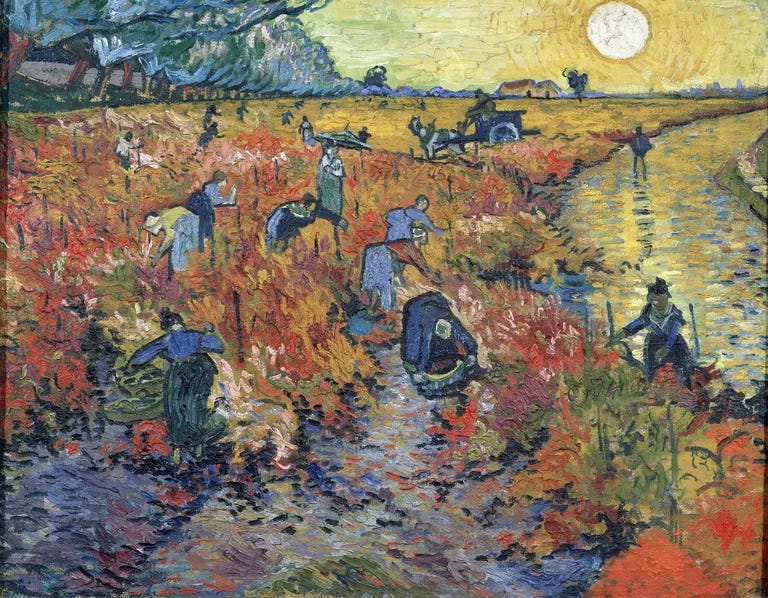
Oscar Wilde died utterly bankrupt in 1900 after paying the legal fines incurred by his arrest and two year sentence of hard labour for ‘gross indecency’. He was a devotee of ‘the Aesthetic Movement’ who believed that ‘art should exist for its beauty alone’. He was teased for his outrageous tastes in fashion. While at university, he wrote an essay called “the Soul of Man’ arguing that capitalism crushed creativity. He also said ‘An educated person’s ideas of Art are drawn naturally from what Art has been, whereas the new work of art is beautiful by being what Art has never been…’.
He also stated ‘The artist should never try to be popular. Rather the public should be more artistic’.
Emily Dickinson was an eccentric recluse who wrote 1800 poems inside 40 hard bound books because she couldn’t not. Her Puritan lawyer father thought poetry was frivolous and unimportant. One of her early poems, published anonymously, ‘Success is counted Sweetest’ (1864) posits that failure is necessary to truly value success. The first volume of her poetry was published four years after her death.
Virtuoso English musician Nick Drake recorded three short devastatingly beautiful, ephemeral albums that contain entire lifetimes but he stopped playing live after finding bored audiences talking throughout his shows and his recorded output was virtually ignored before he succumbed to his prescription drug-addled-maybe-accidental-suicidal tendencies in 1974 aged 26. His cult status only began to slowly grow in the 1980s as his albums began to be re-released, finally flowering when his song ‘Pink Moon’ was used in a 2000 commercial for Volkswagen’s Cabrio. No video of Nick Drake exists. His friend later recalled ‘He knew he was good and, like a proud bird, he liked to display his feathers.’
Before he was considered one of the greatest Existentialist thinkers of the 20th century, Kafka was considered a bit of a joke and though publishing some work, he received little attention. He begged his friend to burn his work as he lay dying in 1924 from tuberculosis but instead his friend found a publisher, and Kafka quickly rose to fame soon after.
The scientific theories of Galileo Galilei - who built the first telescope and discovered sun spots and moon craters and other cool outer space things - were dismissed and criticised in his lifetime by religious nuts who refused to believe the world revolved around the sun. He died in 1642 and his concepts were finally recognised in the early 19th century.
Edgar Allen Poe managed to publish some work in his lifetime but never made enough money to support himself from his writing, and became a stressed out alcoholic after the death of the wife until his own death in 1849.
Johannes Vermeer left his family in debt when he died in 1675, having known only small success in his home town of Delpht, before finding widespread recognition as one of the greatest painters of the Dutch Golden Age when he was ‘discovered’ in the early 19th century. His wife attributed his death to the stress of financial burdens.
Anne Frank wrote ‘Writing in a diary is a really strange experience for someone like me. Not only because I’ve never written anything before, but because it seems to me that later on neither I nor anyone will be interested in the musings of a thirteen year old schoolgirl. Oh well, it doesn’t matter. I feel like writing.’ If she only knew!
Amadeo Modigliani was a noted drunk/drug user who could barely sell a painting. Legend has it a hotel owner bought a small collection of his canvasses for pennies to patch torn mattresses. When a gallery finally agreed to exhibit him, the police shut it down, deeming his distinctive nudes obscene.
Though his friends were great admirers of his work , critics were not impressed by the poetry of self taught young poet John Keats and he spent his entire short life struggling financially and desperately driven to write. He was described by a Mrs. Dilke as ‘brown and as shabby as you can imagine; scarcely any shoes left, his jacket all torn at the back… I cannot tell you what he looked like.’ Noted literary magazine Blackwood described his early work as ‘ignorant and unsettled’ and him as a ‘pretender’. His first book of poetry was not successful and of his follow up he wrote ‘My book is coming out with very low hopes, though not spirits on my part’, though he also believed he would be among ‘the English poets after my death’.
Reclusive weirdo Henry Darger obsessively created hundreds of drawings and watercolours and a fantastical 10-volume, 9 million word manuscript ( apparently 16 times longer than a standard English translation of ‘War and Peace’) for ‘The Story of the Vivian Girls, in what is known as the Realms of the Unreal, of the Glandeco-Angelinnian War Storm, Caused by the Child Slave Rebellion’, between working a menial hospital job and attending a lot of church. His work was discovered in his tiny apartment just before he died in 1973 and he finally began to see some recognition in the early 1990s.
The value of making any kind of art or developing new ideas has to be in the eye of the maker first and foremost. If you know what you are doing has worth, but nobody seems to see it, fuck ‘em, do it it anyway. Maybe you’re right? And if you’re not, what have you lost? Nothing, cos you never had anything anyway. Receiving acclaim and money for art doesn’t make the work any better, or any different, it just feels better. Justified. Money’s great and relieves a lot of anxiety and stress from one’s life.
Bach was remembered more as an educator and an excellent organ player after his death than as a composer. His reputation grew slowly and steadily after his death as his compositions emerged and were studied and performed. Here is a review he received in his lifetime:
One is amazed at his ability, and one can hardly conceive how it is possible for him to achieve such agility, with his fingers and with his feet, in the crossings, extensions, and extreme jumps that he manages, without mixing in a single wrong tone, or displacing his body by any violent movement.
This great man would be the admiration of whole nations if he had more amenity, if he did not take away the natural element in his pieces by giving them a turgid and confused style, and if he did not darken their beauty by an excess of art. (Der critische Musicus [scores] (1738 reprint), p. 46)
Monet’s pioneering Impressionist works were described as ugly, uninteresting and unfinished. The uptight Academie des Beaux-Arts derided and rejected him and one of his most revered paintings ‘Impression: Sunrise’ did not sell when it was first exhibited.
We wouldn’t even know Toulouse Lautrec’s work without his mother’s dedication to promoting it after his death in 1901, even paying a museum to exhibit him. It was a hit. Mother always knows best.
You can’t make art or create things for money or acclaim. I mean, you can, but you shouldn’t. It seems doubtful to me thats going to make something truly great. You have to do it for love. For the pure joy of creation. For the greater good of the work. For the reason that you have to do it. Because it simply demands to exist.
Making art is work. It takes time, patience, persistence, abandon, self discipline, imagination, more work, inspiration, perspiration, dedication, obsession. Very often with nobody cheering you on except for your own damn self. But if you give up on it, you’re the only one that suffers. If you persist, who knows how many people might take joy in it or be moved by it, whether one by one or in a crowd.
The Velvet Underground were notoriously unpopular with the general public even at the height of their inner city cognoscenti fame. Making music without the pressure of pleasing anyone is the ultimate glory. The Independent describes their last album with Lou Reed, Loaded, as ‘one of rock’s most impressive death splutters, and its story a case study in what happens when brilliance goes unnoticed’.
Brian Eno understands that art is its own reward. He says that his reputation is bigger than his sales and declares ‘I console myself thinking that some things generate their rewards in a second-hand way’. He is also noted for stating ‘The Velvet Underground didn't sell many records, but everyone who bought one went out and started a band.’ (Billboard Oct 27, 1997)
Making art or creating things doesn’t have to be a tortured, painful train wreck of a process by a broken, self destructive person. Everything gets easier when artists get paid enough for what they make to sustain themselves.
Absorb art at all times. Consume it for breakfast, eat it for dinner. Seek out beauty, whatever that might look or sound like for you. Everything is beautiful in its own way.
Support it wherever and whenever you can. We need it!
Make it for the pure pleasure of it.
Look at it and listen to it deeply and let it fill all the holes that need filling.
Ignore what other people think at all times.
Stay afraid but do it anyway (thanks Carrie Fisher).
Keep on keeping on.



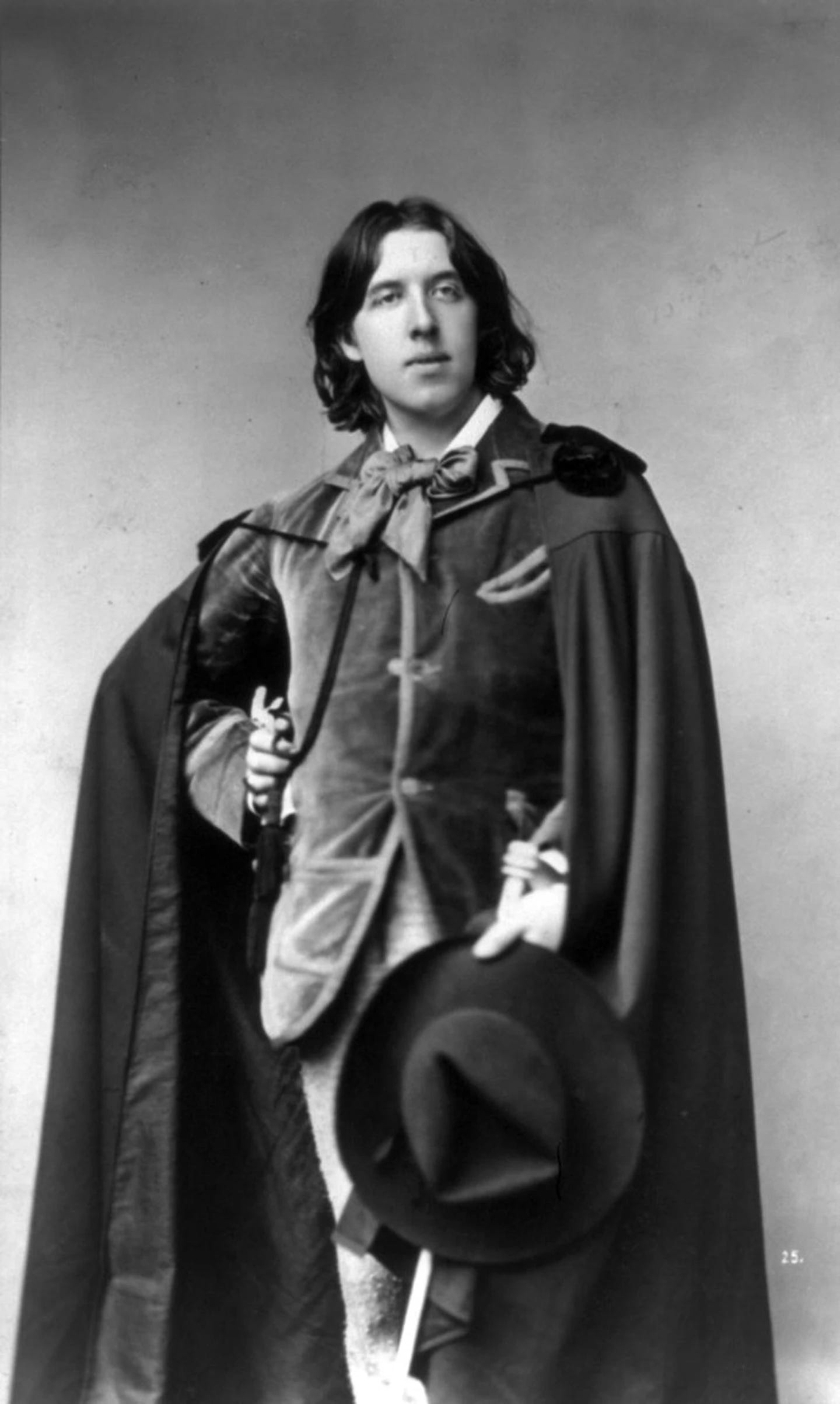
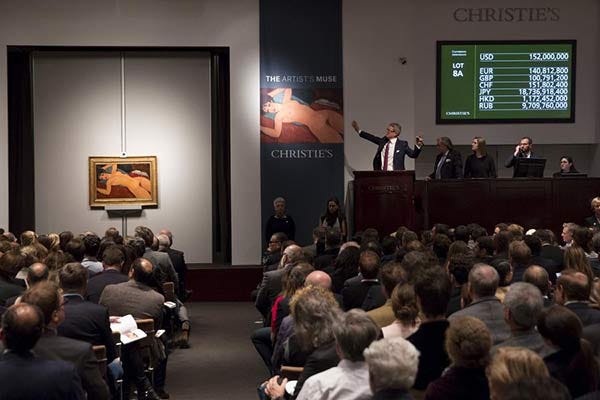
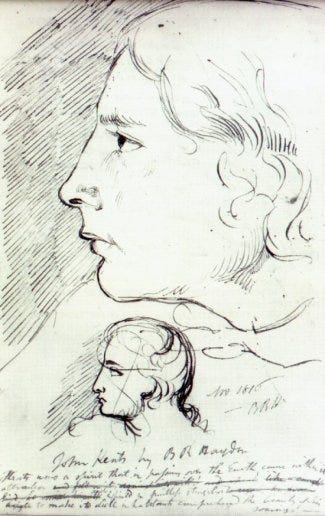
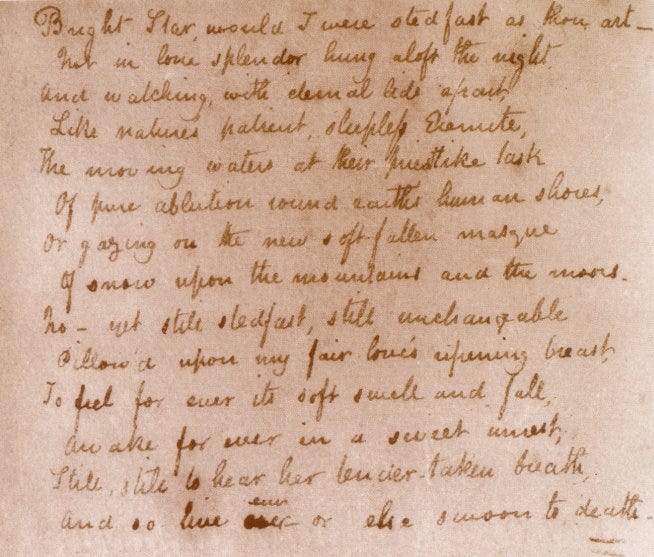
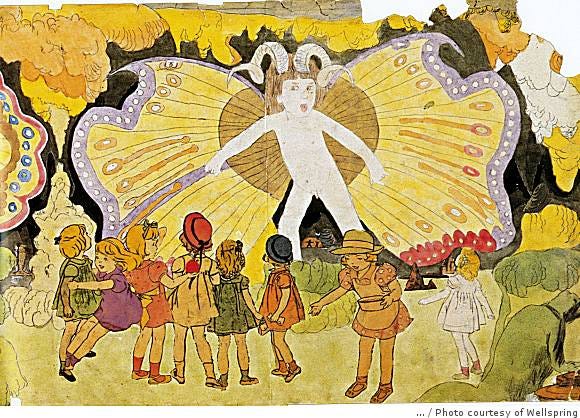
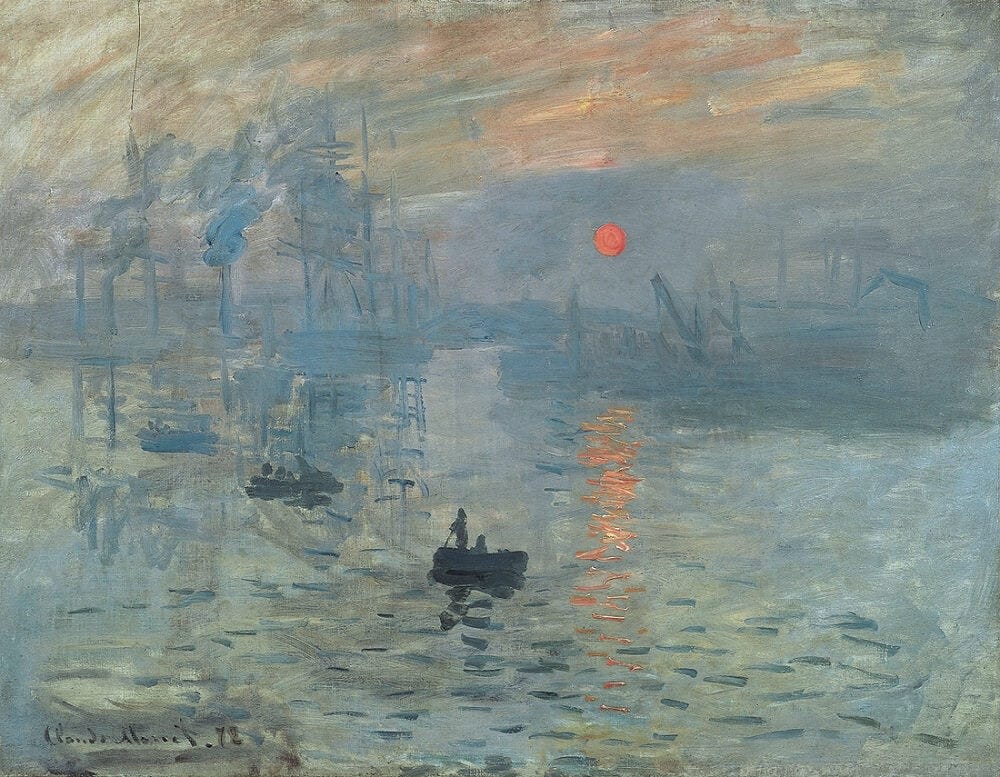
Thank you for posting this. I needed to read it today after talking myself out of writing over and over again because I think no one will care about what I have to say. But I care. And that’s enough.
Keats & Carnage.
Lo, thanks so much for posting this. In yet another instance of beautiful serendipity/fate which great art always seems to bring with it, I've been reading a lot of Keats this week while thinking upon the idea of getting art out into the world while we have a finite time in which to do it. I was brought back to Keats through listening to Marianne Faithfull's/Warren Ellis' beautiful record "She Walks in Beauty". Even thinking about the circumstances of that record - MF contracting Covid back in 2020 and losing the ability to sing so deciding to put out a record of her reading classical poetry with Warren's beautiful synth and violin swirlings as soundtrack - reminds me that art can be made under almost any circumstances if we choose to do so. And we can change with our circumstances if we choose to do so.
The musician/sculptor argument baffled me a little bit. How strange that one artist should see art as some kind of competition between mediums. No matter. Maybe we're all on a "singular road" as Nick Cave sings on 'Lavender Fields'. Aside from Keats I've been listening relentlessly to 'Carnage' this week. Keats and Carnage. And I thought of this when you wrote about art and the people it affects: many, one, or none. What difference, as long as we are making art regardless? Anyway, I hadn't really listened to 'Carnage' much but for the last few days. I can't explain why. I listened to it very quickly when it first came out and kind of set it aside for a time, for reasons unknown. But these don't matter. I figure we hear things when we are meant to hear them. But this week I put it on again and I could not stop playing it. Driving to work a few days ago, quite early one morning, 'Lavender Fields' started up and, without warning, I just started crying. Crying and driving. I do it often when beautiful music affects me. More so as I grow older! The sun rising, the cool air through the window, the swirling strings, Nick singing, "I am travelling appallingly alone/On a singular road"...it all just got to me.
So please accept some Sunday evening thoughts upon reading yet another wonderful post from you. Thanks so much for putting these thoughts out into the world.